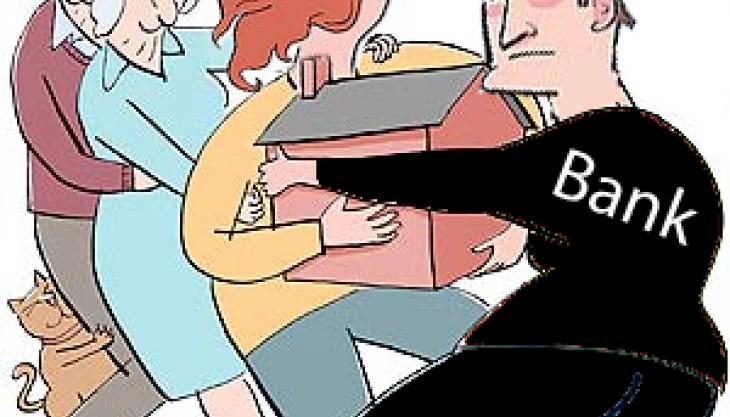Will You Lose Your Rental Property in Bankruptcy?
Submitted by Jen Jones on Tue, 02/02/2010 - 4:30pm

Many of our clients automatically assume they will lose their rental property if they file for bankruptcy. Isn't that the whole idea of bankruptcy? That you give up everything you have, with a few exceptions, in exchange for getting the debt collectors off your back?
Well, no. Many factors come in to play in determining whether or not you will be forced to sell your rental property, including whether you file chapter 7 or chapter 13, how much money you owe on the property and how much income you receive from it.
Let's start with chapter 7. If you file chapter 7, you get an exemption for the equity in your primary residence – how much depends on the state you live in – but rental property doesn't qualify for the standard residence exemption. Therefore, you will only be able to protect the property from sale if you can cover it under your available wildcard exemption. The North Carolina wildcard exemption is $5,000.00 per filer- not much. However, your state may have additional protections if you own the property jointly with your spouse. In North Carolina, if you own the property jointly with your spouse, the property is only subject to claims of joint creditors. If all of your debt is in the name of one spouse or the other, the property may be protected- regardless of the amount of equity. Talk to a experienced bankruptcy attorney, who can examine how you hold title and if you have any joint debt.
But what if you don't have any equity in the house, or minimal equity? What if, for example, the house is worth $100,000 and you owe $120,000, or even $99,000? The trustee's job is to determine whether or not there is money for your creditors, not to take away everything that belongs to you. He will determine the property's worth, then subtract the projected sales costs, selling it and paying taxes on the proceeds. If it's not worth the trustee's time and effort, it's unlikely that he will try to sell it.
With Chapter 13, there are additional caveats and concerns. In general, you should be able to keep your rental property in a Chapter 13 filing. In fact, since the rental property is not your primary residence, you might be eligible for cramdown under chapter 13 – meaning that if you owe more than the property is worth, the bankruptcy judge is able to alter the terms of the mortgage to reflect the property's current value rather than the amount you originally agreed to pay for it. This could lower your monthly mortgage payments, as well as the long term amount you have to pay to the bank for the property. Cramdown isn't allowed on primary residences, but it is allowed on other secured debts, including rental property.
Do note, however, that rental property can, under certain circumstances, cost you money. The trustee in a Chapter 13 case will look at all the costs associated with the property – your mortgage payments, plus taxes, insurance, upkeep and repairs. If these costs outweigh the income the property brings in, the trustee may object to your plan on the basis that the money you're spending on the property should be distributed to your unsecured creditors. In such a case, surrendering the property may be your best option. However, this is a very fact-sensitive issue and depends on how your jurisdiction interprets very complex provisions of the bankruptcy code. Only an experienced bankruptcy attorney can advise you on your specific situation. Bottom line- if you're deeply in debt, talk to a bankruptcy attorney and get the real facts. In North Carolina, call the Law Offices of John T. Orcutt. Convenient office locations in Raleigh, Durham, Wilson and Fayetteville. Call today: +1-833-627-0115 or visit www.billsbills.com for more information.
Debts Hurt! Got debt? Need help? Get started below!
Serving All of North Carolina
- Bankruptcy Attorneys Raleigh NC (North)
- Bankruptcy Attorney Fayetteville NC
- Bankruptcy Attorney Durham NC
- Bankruptcy Attorneys Wilson NC
- Bankruptcy Attorneys Greensboro NC
- Bankruptcy Attorneys Southport NC
- Bankruptcy Attorneys Wilmington NC
Bankruptcy Attorneys Raleigh NC (North)
6616 Six Forks Rd #203 Raleigh, NC 27615 North Carolina
Tel: (919) 847-9750

Bankruptcy Attorney Fayetteville NC
2711 Breezewood Ave Fayetteville, NC 28303 North Carolina
Tel: (910) 323-2972

Bankruptcy Attorney Durham NC
1738 Hillandale Rd Suite D Durham, NC 27705 North Carolina
Tel: (919) 286-1695


Bankruptcy Attorneys Greensboro NC
2100 W Cornwallis Dr. STE O Greensboro, NC 27408 North Carolina
Tel: (336) 542-5993

Bankruptcy Attorneys Southport NC
116 N Howe St. Suite A Southport, NC 28461 North Carolina
Tel: (910) 218-8682

Bankruptcy Attorneys Wilmington NC
116 N. Howe Street, Suite A Southport, NC 28461 North Carolina
Tel: (910) 447-2987
